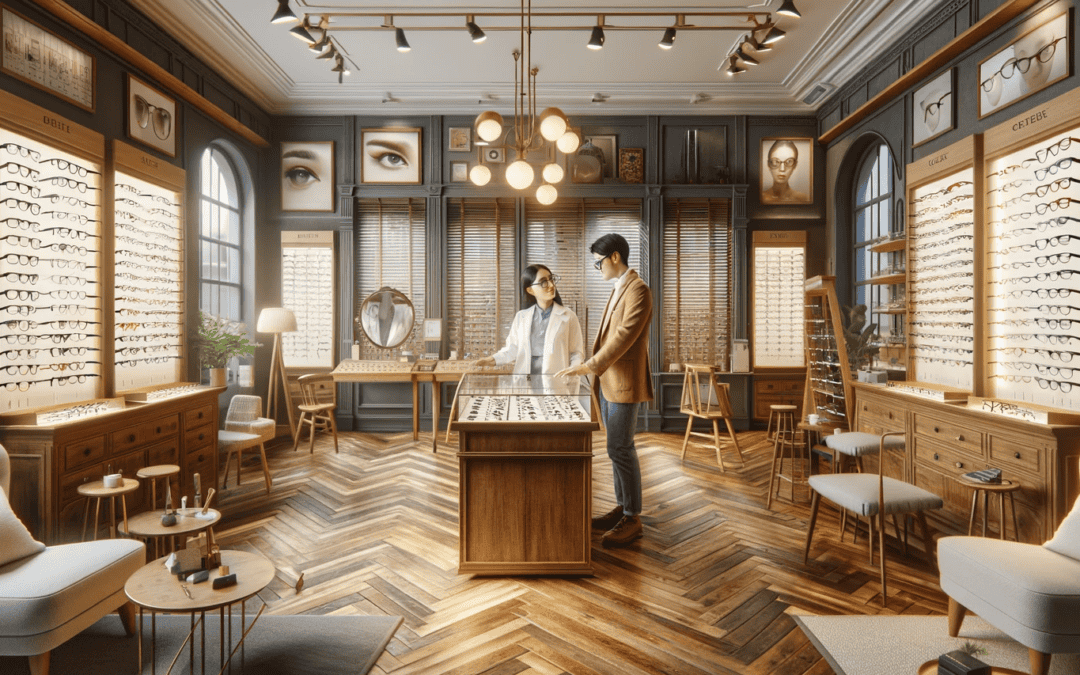What Does an Optician Do?
An optician is a trained professional who assists in the fitting and dispensing of eyeglasses and contact lenses. Unlike optometrists or ophthalmologists, opticians do not conduct eye exams or diagnose eye conditions. Instead, they focus on making sure that your eyewear is customized to fit your specific needs. Opticians play a key role in ensuring that the glasses or contact lenses you receive are comfortable, functional, and tailored to your prescription and lifestyle.
How Is an Optician Different from an Optometrist or Ophthalmologist?
It’s common to confuse opticians with optometrists and ophthalmologists, but they have distinct roles. Optometrists are eye care professionals who perform eye exams, prescribe corrective lenses, and diagnose and treat various eye conditions. Ophthalmologists are medical doctors who specialize in eye health, performing surgeries and treating more complex eye diseases.
Opticians, on the other hand, take the prescriptions provided by optometrists or ophthalmologists and help you select the right frames, lenses, and fittings. They do not diagnose eye conditions or prescribe lenses but are highly knowledgeable about eyewear options, frame fitting, adjustments, and lens add-ons.
What Should You Expect When Visiting an Optician?
When you visit an optician, you can expect them to guide you through the process of selecting and fitting eyeglasses or contact lenses. They will first review your prescription and PD, discuss your lifestyle needs to recommend the best frame style and lens features for you. This may include specialized lenses like progressives, blue light blocking coatings, or photochromic lenses that change color in different lighting.
The optician will also take measurements of your face and eyes to ensure that your glasses are properly centered and aligned. Once you’ve selected your eyewear, the optician will make any necessary adjustments to ensure that your frames fit comfortably and provide optimal vision. If your eyewear needs to be repaired or adjusted in the future, you can return to the optician for maintenance and support.
What Are the Key Skills of a Good Optician?
A good optician should possess a range of skills to help you find the perfect eyewear. They should be able to properly fit frames based on your face shape, prescription, and comfort needs. They should also understand how to make precise measurements for different lens types, read and interpret lens prescriptions using specialized equipment like a lensmeter, and repair and adjust frames as needed.
Additionally, an optician should be knowledgeable about different lens options and frame materials and be able to explain the benefits and drawbacks of each. They should be skilled in recommending lens coatings or add-ons that will best suit your visual needs, whether that includes anti-glare coatings, UV protection, or scratch-resistant treatments.
How Can You Tell If an Optician Is Right for You?
Choosing the right optician is an important decision, and it’s often best to trust your instincts. The individual assisting you should appear confident, knowledgeable, and passionate about their work. A good optician will be comfortable with handling tools, using electronic measuring devices, and communicating clearly about your options.
Your experience with an optician should feel comfortable and positive. If something feels off or if you don’t feel confident in the optician’s recommendations or expertise, it may be best to seek service elsewhere. An optician who truly understands your needs will take the time to listen to your concerns and provide thoughtful guidance based on their expertise.
How Are Opticians Trained?
The training requirements for opticians vary widely depending on where you live. In some states, there are strict regulations that require formal education, certification, and licensing. This can include completing a two-year opticianry program at a college or technical school, followed by passing a certification exam.
In other states, there are no formal requirements, and individuals may learn on the job through an apprenticeship or on-site training. This means that two opticians working in stores just a few miles apart may have very different educational backgrounds and qualifications.
For example, in parts of the United States, regulations differ from state to state. A store in a state requiring opticians to complete a two-year education and pass a certification may be just across the border from a state with no such requirements. Despite these differences, the quality of service provided often depends more on the individual optician’s experience, skills, and dedication than on the regulations in place.
What Qualities Should a Good Optician Have?
A good optician should be approachable, attentive, and willing to help you find the right eyewear for your needs. They should be detail-oriented, as proper measurements and fittings are crucial for ensuring comfortable vision. Ideally, an optician is passionate about eyewear and also be patient and willing to answer any questions you may have about your lenses, frames, or eyewear care.
Why Is Choosing the Right Optician Important?
Selecting the right optician is important because they play a key role in ensuring your eyewear is not only functional but comfortable and suited to your daily activities. A good optician will help you navigate the many options available for frames and lenses and make sure that your glasses or contact lenses fit properly. The right optician will provide ongoing support, from fitting to adjustments and repairs, ensuring that your eyeglass shopping experience is always positive.



